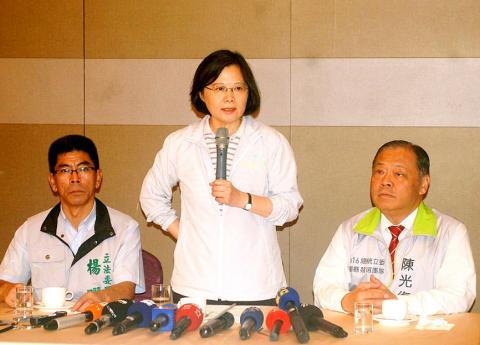Democratic Progressive Party (DPP) presidential candidate Tsai Ing-wen (蔡英文) yesterday said that she would not rule out visiting Beijing and meeting Chinese President Xi Jinping (習近平) if she wins the Jan. 16 election.
Asked by reporters whether she would visit Beijing if invited, given the widespread public criticism of President Ma Ying-jeou’s (馬英九) planned meeting with Xi in Singapore tomorrow, especially from the pan-green camp, Tsai said: “There are just over 70 days left until the election and considering the atmosphere in society, I think the possibility of my visiting Beijing is not too high, but if I am elected next year, if the conditions that I mentioned before — including openness and transparency, equality and dignity, and no politics are met — I would not rule out the possibility.”
However, Tsai took a tougher tone commenting on Ma’s press conference at the Presidential Office yesterday morning and his remark that tomorrow’s meeting would create the basis to “build a bridge” for future meetings and interactions between the leaders of the two sides of the Taiwan Strait.

Photo: CNA
“If Taiwan’s society and its leader do not create the necessary mechanism, and follow the necessary procedures to allow society to take part in the decisionmaking process on major decisions, allowing parliamentary supervision and having transparency of information, then even if there is a bridge, it is not a concrete and stable one,” Tsai said on the sidelines of a campaign event in Penghu County.
The public does not have a problem with cross-strait interactions and meetings of top leaders unless opaqueness becomes an issue, she said.
Later yesterday, DPP Secretary-General Joseph Wu (吳釗燮) said during a radio interview that the DPP would not organize a “supervisory group” to monitor Ma when he is in Singapore, as the party did in 1993 when then-Straits Exchange Foundation chairman Koo Chen-fu (辜振甫) and China’s then-Association for Relations Across the Taiwan Straits chairman Wang Daohan (汪道涵) held a meeting in Singapore.

Right-wing political scientist Laura Fernandez on Sunday won Costa Rica’s presidential election by a landslide, after promising to crack down on rising violence linked to the cocaine trade. Fernandez’s nearest rival, economist Alvaro Ramos, conceded defeat as results showed the ruling party far exceeding the threshold of 40 percent needed to avoid a runoff. With 94 percent of polling stations counted, the political heir of outgoing Costa Rican President Rodrigo Chaves had captured 48.3 percent of the vote compared with Ramos’ 33.4 percent, the Supreme Electoral Tribunal said. As soon as the first results were announced, members of Fernandez’s Sovereign People’s Party

MORE RESPONSIBILITY: Draftees would be expected to fight alongside professional soldiers, likely requiring the transformation of some training brigades into combat units The armed forces are to start incorporating new conscripts into combined arms brigades this year to enhance combat readiness, the Executive Yuan’s latest policy report said. The new policy would affect Taiwanese men entering the military for their compulsory service, which was extended to one year under reforms by then-president Tsai Ing-wen (蔡英文) in 2022. The conscripts would be trained to operate machine guns, uncrewed aerial vehicles, anti-tank guided missile launchers and Stinger air defense systems, the report said, adding that the basic training would be lengthened to eight weeks. After basic training, conscripts would be sorted into infantry battalions that would take

EMERGING FIELDS: The Chinese president said that the two countries would explore cooperation in green technology, the digital economy and artificial intelligence Chinese President Xi Jinping (習近平) yesterday called for an “equal and orderly multipolar world” in the face of “unilateral bullying,” in an apparent jab at the US. Xi was speaking during talks in Beijing with Uruguayan President Yamandu Orsi, the first South American leader to visit China since US special forces captured then-Venezuelan president Nicolas Maduro last month — an operation that Beijing condemned as a violation of sovereignty. Orsi follows a slew of leaders to have visited China seeking to boost ties with the world’s second-largest economy to hedge against US President Donald Trump’s increasingly unpredictable administration. “The international situation is fraught

GROWING AMBITIONS: The scale and tempo of the operations show that the Strait has become the core theater for China to expand its security interests, the report said Chinese military aircraft incursions around Taiwan have surged nearly 15-fold over the past five years, according to a report released yesterday by the Democratic Progressive Party’s (DPP) Department of China Affairs. Sorties in the Taiwan Strait were previously irregular, totaling 380 in 2020, but have since evolved into routine operations, the report showed. “This demonstrates that the Taiwan Strait has become both the starting point and testing ground for Beijing’s expansionist ambitions,” it said. Driven by military expansionism, China is systematically pursuing actions aimed at altering the regional “status quo,” the department said, adding that Taiwan represents the most critical link in China’s